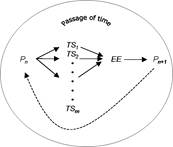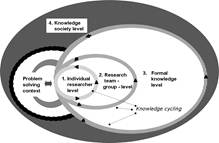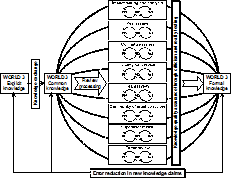Hi Rich
You have posed some large questions here, so I have tried to answer them as best I can – and perhaps in too much haste (the day beckons). I have also copied in excerpts from things I have written – I don’t want this to be seen as self promotion. I am just doing my best to put words round what I have found over the past 6-10 years to be very complex matters.
Of course, for those with no interest, just delete!
RC: But I am curious about your precise definition and use of the term “evolving knowledge”.
I have not refined a precise definition other than ‘knowledge is an emergent property of an evolutionary system”. See below as to what this is about – excepts cut and paste under the following headings.
· Towards an ontology of knowledge
· Research knowledge and the dynamics of hierarchically complex systems
· Formal knowledge level
RC: Do you feel the term “evolving” is adequate for such documents as laws, regulations, and other records that are only CHANGED (not truly refined) with new legislators, regulators, and recorders other than the originators? When the power structure changes, the laws flip 180 degrees.
Yes, … the changes reflect a renegotiation of whatever knowledge claim is being considered – to some extent a bit like on the diagram below under the discussion of formal knowledge (see below). Formal knowledge artefacts are the official records of these socially constructed agreements. Each of these formal knowledge claims has a context. And, thus, I am of the view that knowledge artefacts need a contextual description around them. Here is quote from a report to the International Council on Archives about the very vexed problem about how to handle the challenge of the management of information about nuclear waste. This highlights there are very significant conceptual challenges about how you create an information management framework that can evolve forward over not hundreds of years, but potentially 000’s of years (I am only pointing to the source of thinking here and not suggesting the notion of open public knowledge networks is relevant to this particular idea of the managing the records about nuclear waste materials!).
It has been a traditional role of archives to ensure that adequate contextual information is gathered in
association with records to enable their use as evidence of past actions. To this end the International
Council on Archives developed the International Standard for Archival Authority Records (Corporations,
Persons and Families) [ISAAR(CPF)] to assist archives gather and use contextual information in
a systematic and interoperable manner. Taking this as a starting point this study explores what might
be achieved if the concept of contextual information management is extrapolated into the realm of
open networked public knowledge.
It is from this type of problem that the idea of contextual informatics has been taken up in other domains as these pertain to open networked public knowledge. I have become very interested in this idea of contextual information management. If you look closely at this website (particularly that it includes commitments to time based informatics), you will notice that this is published according to some of the underlying principles associated with contextual information management. Note also that these matters underpin my interests in “public knowledge”and what we describe towards the end of this book chapter as “public knowledge spaces”.
I think these ideas are connected to, but perhaps quite different to your idea about an ontology of self interest.
RC: Evolution, as biologically formulated, doesn’t seem to go through such major revisions, but instead to make slight constructive incremental changes as organism classes encounter new environments and new competitors. Is this difference relevant to the term “evolving knowledge”?
Yes – see Popper’s general theory of evolution diagram below.
RC: But the word “evolving” seems to me to require that kind of record by one single source, or even better, a reproducible record, such as Darwin’s book, a species’ chromosomes, and self reproducing automata that faithfully iterate pretty much the “same” structure time after time
This was the mastery of the Gutenburg printing press. And, look what happened in terms of social revolution after this was invented. There is more I could add to this especially in light of your reference of the US constitution, but I will constrain this response at the moment.
Hope this helps and does not overwhelm.
Richard
From Page 152 of Textual representations and knowledge support-systems in research intensive networks
1. Towards an ontology of knowledge
In this section we aim to outline an ‘ontology of knowledge’. At base level here, we are interested in unpacking the theoretical questions and inter-relationships that arise when exploring the boundaries between lifeworlds and science; and between constructivism and realism. We do this first by discussing the notion that knowledge is an emergent property of evolutionary systems. We then describe the means by which different types of knowledge emerge through time within research enterprises. Finally, we refer to other types of cyclical models associated with the acquisition and growth of knowledge.
Knowledge as an emergent property of evolutionary systems
What do we mean by ‘knowledge’? In knowledge management there are almost as many definitions of knowledge as there are practitioners, to say nothing of arguments about relationships between data, information and knowledge (e.g. Land 2009; Stenmark 2002). Here we adopt Karl R. Popper’s (1972) concept that ‘knowledge is solutions to problems’—or at least claims towards solutions. We choose to adopt this approach because it is grounded in an idea called an ‘evolutionary epistemology’ (‘EE’). Donald T. Campbell (1974) first coined this term. However, Campbell credits Popper with its origination and with expressing its fundamental perspective in Logik der Forschung (1935). Both Campbell (1959, 1960, 1991) and Popper argued that knowledge emerges in living things as they adapt to the world. In his most complete explanation, Popper (1972, pp. 241–45) referred to this as his ‘general theory of evolution’.

Figure 6.1 Popper’s ‘general theory of evolution’
From Hall 2005, after Popper 1972, p. 243
In this theory outlined in Figure 6.1, Pn is a ‘problem situation’ the living entity faces and TSm represents a range of ‘tentative solutions’, ‘tentative hypotheses’ or ‘tentative theories’ the living entity may propose or act on. EE (‘error elimination’) represents a process by which, tentative solutions are tested or criticised to selectively remove solutions or claims that don’t work in practice. Popper and Campbell are slightly different in their perspectives of EE in that Popper sees the selective forces of reality eliminating the failures, whereas Campbell sees selection leaving behind those tentative solutions that didn’t fail. In either case, Pn+1 represents the now changed problem situation remaining after a solution has been incorporated. As the entity iterates and reiterates the process (the arrow indicating iteration is added), it will construct increasingly accurate representations of and responses to external reality. These interconnected ideas formed the basis of Popper’s (1972) ‘general theory of evolution’ and the ‘growth of knowledge’ that takes place in living entities. This idea of an evolutionary epistemology encompasses what we mean when we say that knowledge is an emergent property of an evolutionary system. The arrows in Figure 6.1 indicate that these iterations through time are sequential processes and may involve self-observation. Some may suggest that such system attributes can result in a viciously circular and self-reenforced closed system (e.g., Luhmann 1995a, 1995b), But this is not the case, because the evolutionary system is open along the time axis (Hall and Nousala 2010). We suggest this latter point might be seen as slightly innocuous, but it could have significant ramifications for future research directions. For example, we think it opens up creative possibilities within the context of Cope and Kalantzis’s juxtaposition of the realm of the lifeword against the realm of science. It might also have the potential to create a pathway to be able to hold in balance both constructivist, including radical constructivist, and realist perspectives. Thus we conclude the place of time within our ontology of knowledge is an exceptionally important one.
To fully comprehend what might be possible and what might become available through Popper’s notion of an evolutionary epistemology it is necessary to consider additionally that Popper thought that knowledge grows through iterated interactions of three ontological domains or ‘worlds’ (ibid) . We contend this articulation of an ontology of knowledge is crucial in order to understand and explain the different types of knowledge that evolve through time.
Our ontology development therefore begins with defining these three distinct, but interacting ontological domains or ‘worlds’ (Popper 1972, p. 107, etc., 1978; as extended by Hall 2005, 2006a). ‘World 1’ (W1) is ‘the world of physical objects or of physical states’, including the un-interpreted dynamics of everything physical. ‘World 2’ (W2) is the ‘the world of states of consciousness, or of mental states, or perhaps of behavioural dispositions to act’ which we extend to encompass the ‘living’ world of cybernetics, cognition and knowledge in the broad sense. Popper (1972) includes ‘subjective’ knowledge (the subject’s personal knowledge), which is an individual or subject’s inherent propensity or disposition to ‘behave or react (loc. cit. p. 108)’ in certain ways in particular circumstances in W2. This approximates Polanyi’s (1958, 1966) personal and ‘tacit’ knowledge and we would suggest is inclusive of certain aspects of the lifeworld discussed in the previous chapter. ‘World 3’ (W3) includes all kinds of persistently encoded knowledge (e.g., the logical contents of written documents, electronically encoded information, sequences of nucleotides in a DNA molecule, etc.; Popper 1972, pp. 73–74). ‘Knowledge in the objective sense is knowledge without a knower; it is knowledge without a knowing subject’ (Popper 1972, p. 109). Codified knowledge is ‘objective’ because its logical content can exist in W3 logically encoded in the physical structure of a W1 container that can exist separately from the ‘knowing subject’, and can be decoded in W2 with similar subjective meanings by different subjects.
A fundamental question is: How does knowledge emerge when there are three ontological domains involved? Popper differed significantly from the logical positivists in that he argued no objective truth could be proved—only that certain claims could be shown to be in error through tests or criticisms of the claims as they impact reality (W1). He argued that knowledge claims may be aggregated and transformed, progressing from raw sense data registering impacts of the physical world on a living entity (for example, experience or observations of events), to well-tested and proven solutions for the major problems of life (Popper 1999). A theory referring to W1 can be constructed by people in W2 and (optionally) be expressed and shared in the form of W3 content. Through iterated cycles of hypothesising solutions, and testing and criticising them to eliminate errors, knowledge claims asserted in W2 or W3 can approach correspondence with W1’s reality, as Popper (1972) explained in his ‘general theory of evolution’ (Figure 6.1).
From Page 164
2. Research knowledge and the dynamics of hierarchically complex systems
Modern-day research enterprises work to increase the knowledge society’s (Lederberg 1991), formal knowledge and to solve pressing problems. We claim that the growth of knowledge in a knowledge society takes place in a hierarchically complex system comprised of at least four interacting levels of cyclical knowledge building. In what follows, we expand our ontology to discuss some of the processes through which research knowledge emerges and grows through time. We are particularly interested to highlight the dynamics through which research knowledge claims are constructed and evaluated and to show how the nature of knowledge that emerge from these varying levels of knowledge cycling. In outlining parts of our discussions we also refer to aspects of Popper’s general theory of evolution (see Figure 6.1) and Boyd’s OODA loop process (see Figure 6.6).

Figure 6.6 The hierarchical levels of knowledge cycling in a research enterprise
From Page 164
3. Formal knowledge level
The third, higher level involves the development of formal knowledge. Within the research enterprise this can include formal publishing processes. In simplified form, at this level the knowledge cycle involves:
· submission of a paper by a researcher or group of collaborators to a publisher or authentication body
· initiation of a peer review process by an editor working at the organisational level that involves observing and orienting to the paper and selecting appropriate reviewers for it
· individual peer reviewers at the researcher level each observing and orienting to the paper and in some cases testing the knowledge claims, criticising them and returning their explicit criticisms to the publisher or authentication organisation
· the editor at the organisational level either committing the paper to formal publication as an addition to the BoFK or returning it to the author(s) as a rejection or with a request for changes or improvement—which then initiates further cycles at the investigator and collaborator layers.
Within the research enterprise itself, the creation of formal knowledge can also involve various internal social processes of critiquing such as those that occur through supervision, community of practice reviews, committee structures and the like (Figure 6.8). We contend that this review of common knowledge is a knowledge quality-assurance process (Vines and Naismith 2002). Through such review processes, understandings and agreements are reached about the degree to which knowledge claims can be used to solve real-world problems (Firestone and McElroy 2003a, 2003b). Such agreements can be struck in a range of different contexts, including for example via staff supervision, or through formal research projects, through formal committee structures or through journal publishing peer review mechanism.

Figure 6.8 Social construction and formalisation of knowledge
Part of any negotiation of ‘agreements’ involves dealing with the varying belief paradigms held by multiple stakeholders. What is needed is not a process of reaching ‘shared or consensual truths’ about a research domain’s knowledge base, nor should decisions be made on traditional hierarchical _expression_ of power. Rather, the review process (and the role of the reviewer in the process) is to test knowledge claims against the real world (W1) and ensure that decisions reflect agreed views about what will deal with real problems—until something else more pragmatically beneficial emerges (Firestone and McElroy 2003a). Ideally, reviewers, editors or those authorised to approve formal knowledge claims, such as technical committee chairpersons should learn to make their observations taking into account multiple perspectives and to have their own underlying assumptions continuously tested (Firestone and McElroy 2003b) and share this learning throughout any knowledge-system network.
From: ontolog-forum-bounces@xxxxxxxxxxxxxxxx [mailto:ontolog-forum-bounces@xxxxxxxxxxxxxxxx] On Behalf Of Rich Cooper
Sent: Friday, 19 August 2011 2:58 AM
To: '[ontolog-forum] '
Subject: Re: [ontolog-forum] Self Interest Ontology
Dear Richard,
Thanks for the reference to Darwin’s evolving knowledge. But I am curious about your precise definition and use of the term “evolving knowledge”. For your example, Darwin’s evolving book drafts make sense because the knowledge was recorded, and then iteratively refined, to better and better fit the observations, theories and knowledge gained at the time he iterated them.
But the word “evolving” seems to me to require that kind of record by one single source, or even better, a reproducible record, such as Darwin’s book, a species’ chromosomes, and self reproducing automata that faithfully iterate pretty much the “same” structure time after time until it better fits the changing environment or situation.
Do you feel the term “evolving” is adequate for such documents as laws, regulations, and other records that are only CHANGED (not truly refined) with new legislators, regulators, and recorders other than the originators? When the power structure changes, the laws flip 180 degrees.
For example, laws proposed by one set of legislators are repealed by others (e.g., Obamacare), and therefore are not truly evolving in REFINEMENT in that they are simply crafted and then recrafted by contending competing parties, without faithful preservation of past records.
One exception that proves the rule might be the US constitution, which has only been amended without major modifications (refined?), but even there, consider the prohibition amendment, which was later repealed. Consider the drug regulations, which are likely to soon be forced by events to be deregulated and replaced by licensing and taxation, and consider laws prohibiting stores from opening on Sundays which were in force a generation ago here, and are no longer applicable in a day when every kind of store, even liquor stores, can open on Sundays.
Change is not necessarily evolutionary refinement, IMHO; it’s just a different power structure implementing a morality it believes in at one point in history being replaced by a power structure that disapproved of those morality laws in another generation. The laws prohibiting abortion here in the fifties were replaced in the following decades by laws permitting them, though they are still a subject of political contention, and even spill over into interference with the development of stem cell medical treatment. Those changes are solely motivated by one moral prescription replacing another, not by refinement.
Evolution, as biologically formulated, doesn’t seem to go through such major revisions, but instead to make slight constructive incremental changes as organism classes encounter new environments and new competitors. Is this difference relevant to the term “evolving knowledge”?
So while I like the term evolving knowledge, I would also like to have a more precise definition to clarify what is, and what is not, included in the terminology. That would make it easier to discuss on the list. Otherwise we are likely to exhibit incommensurable interpretations of evolving knowledge.
Thanks for a really great insight! I’m sure it will evolve here in refinement, at least for this set of list subscribers.
-Rich
Sincerely,
Rich Cooper
EnglishLogicKernel.com
Rich AT EnglishLogicKernel DOT com
9 4 9 \ 5 2 5 - 5 7 1 2


